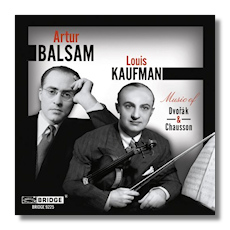
The Internet's Premier Classical Music Source
Related Links
-
Chausson Reviews
Dvořák Reviews - Latest Reviews
- More Reviews
-
By Composer
-
Collections
DVD & Blu-ray
Books
Concert Reviews
Articles/Interviews
Software
Audio
Search Amazon
Recommended Links
Site News
 CD Review
CD Review
Artur Balsam & Louis Kaufman

- Antonín Dvořák:
- Piano Quartet #2 in E flat, Op. 87 1
- Piano Trio #3 in F minor. Op. 65 2
- Romantic Pieces, Op. 75 3
- Ernest Chausson: Concerto in D for Violin, Piano, and String Quartet, Op. 21 4
Artur Balsam, piano
1 Peter Rybar, violin
1 Oskar Kromer, viola
1 Antonio Tusa, cello
2 Marcel Cervera, cello
2-4 Louis Kaufman, violin
4 Pascal String Quartet
Bridge 9225A/B ADD monaural 2CDs 69:42, 45:31
Pianist Gerald Moore sometimes was referred to as "The Unashamed Accompanist." The same might have been said about Artur Balsam. He was an outstanding soloist, but he seemed quite content to be a chamber musician and to partner musicians such as Yehudi Menuhin and Nathan Milstein.
Violinist Louis Kaufman also played a role that some might describe as reticent. For many years, he played in Hollywood studio orchestras, and his work can be heard in films such as Gone With the Wind and Casablanca (both scored by Max Steiner). Like Balsam, he was an outstanding musician who, although he had a distinguished career as a soloist, seemed to find satisfaction in playing chamber music with equally talented colleagues. Also like Balsam, he had a taste for ferreting out unjustly forgotten music and composers. In the late 1940s, he was the very first violinist to record what was then a little-known work: The Four Seasons, by Antonio Vivaldi. (Just imagine that!)
At Kaufman's instigation, around 1950 he and Balsam began making recordings together for the Concert Hall label, for which both musicians had been recording separately. Again, the repertoire was unusual, at least for the time. For the present release, Bridge has selected three Concert Hall recordings by Kaufman and Balsam, plus a fourth Concert Hall recording in which Balsam is joined by members of the Winterthur String Quartet in Dvořák's Piano Quartet #2.
All four recordings are delectable, but my favorites are on the second CD: Dvořák's four Romantic Pieces and Chausson's Concerto for Violin, Piano, and String Quartet. Kaufman's style of playing is a little old-fashioned (not a lot of vibrato, but the liberal use of portamento - sliding from one note to the next) and it suits the sentimental Dvořák work perfectly. Chausson's Concerto, which sometimes seems like the perfect accompaniment for a reading of Proust, really catches fire here, thanks also to Balsam, who once commented that Chausson's piano writing in this work was "cruel." (For Balsam, that was saying a lot.) I've known this work ever since I was in graduate school, when I found a used LP of the Casadesus recording, and I have enjoyed it ever since. Now, because of Balsam, Kaufman, and the Pascal String Quartet, I can love it too.
The first CD opens with Dvořák's worthy but under-programmed Piano Quartet #2. It begins with one of the composer's most striking ideas, and hardly runs out of steam once during the next 34 minutes. Bridge's annotator complains that the violist and the cellist aren't up to the high level set by Balsam and violinist Peter Rybar. That might be true, but the recording is hardly unsuccessful. The Piano Trio #3 is more familiar, and here it receives a nicely relaxed (even modest) but nevertheless bright performance from Balsam, Kaufman, and Cervera.
This release comes with entertaining (but poorly proofread) booklet notes by Roman Markowicz, who studied with Balsam. Adam Abeshouse is the restoration and mastering engineer. No information is given about this in Bridge's booklet, but it sounds as if Abeshouse had fairly noisy LPs to work with, and the sound on these discs has plenty of thumps and other artifacts. Still, the results never sound over-filtered, and there's a lot of power left in those old grooves, so not to worry.
Copyright © 2007, Raymond Tuttle


















